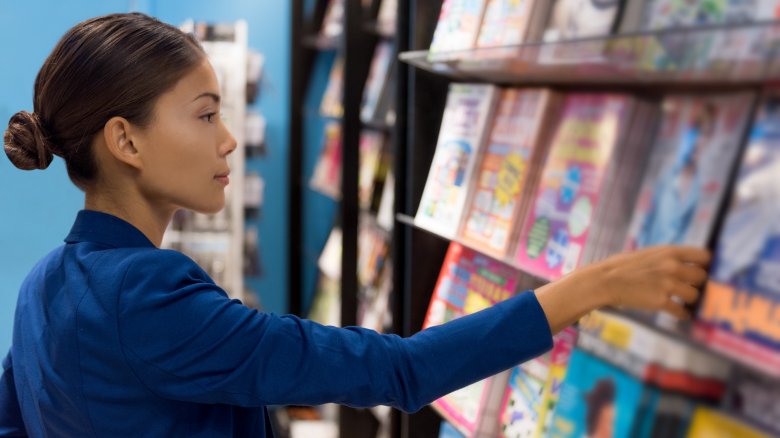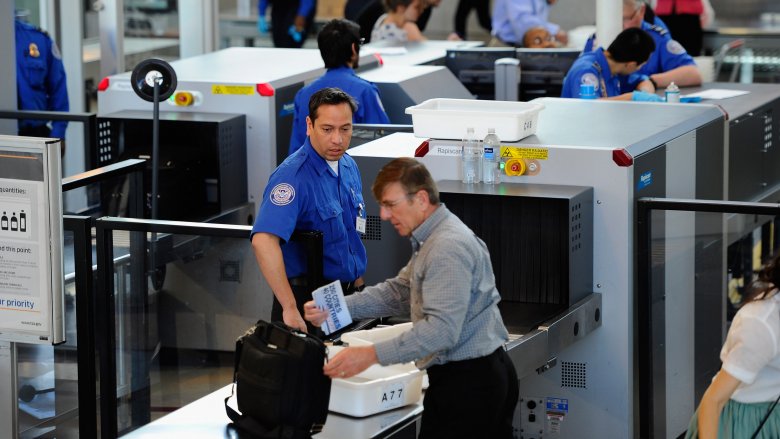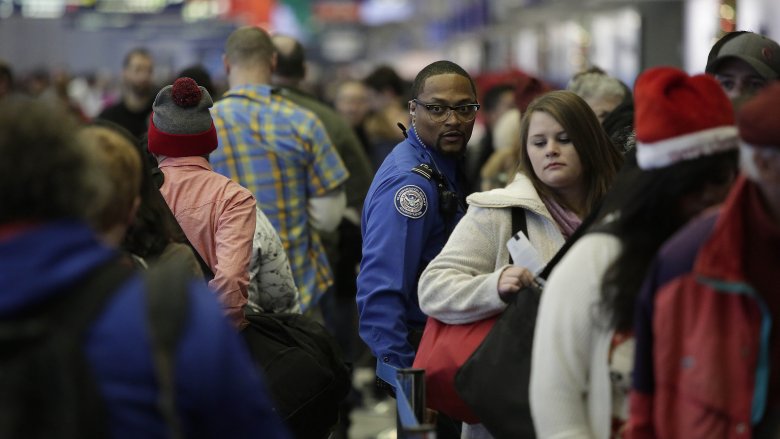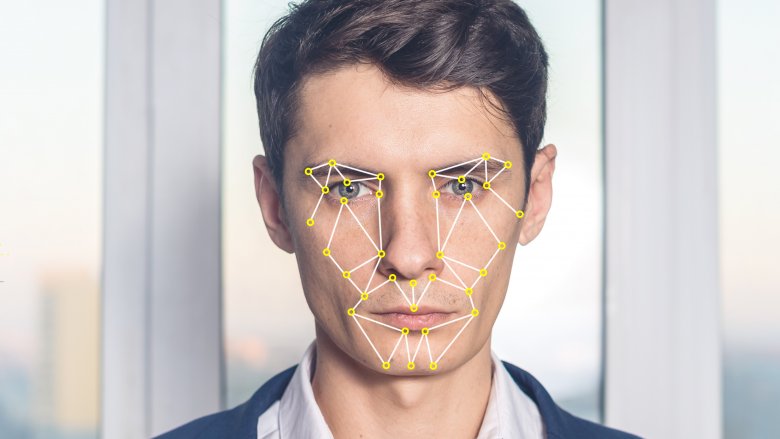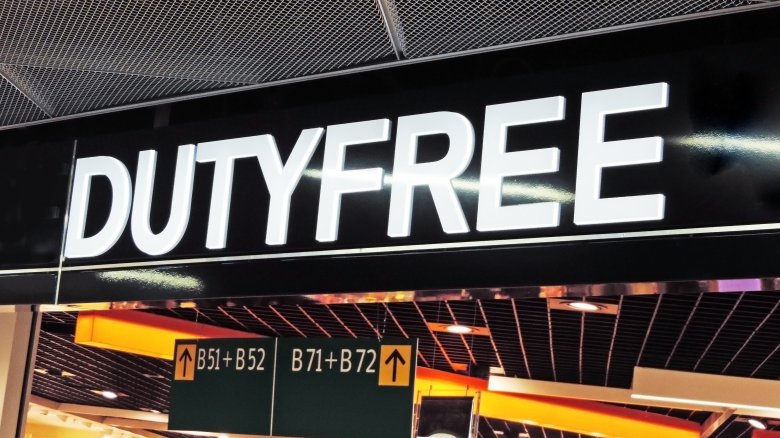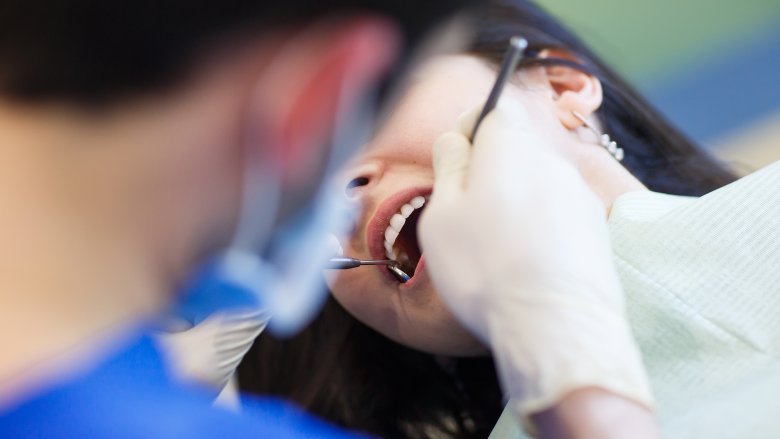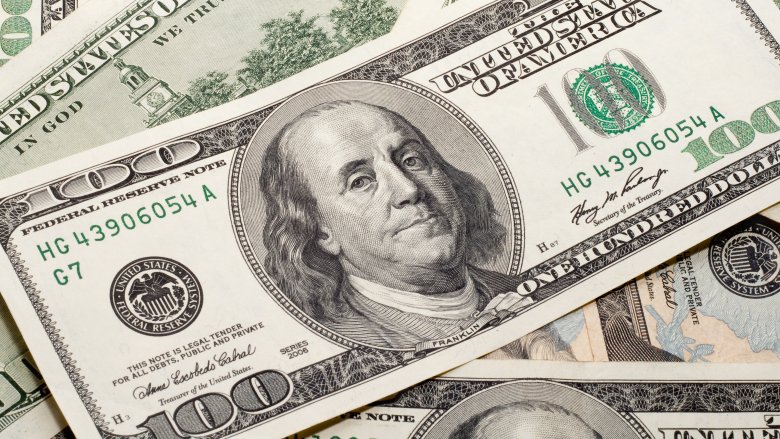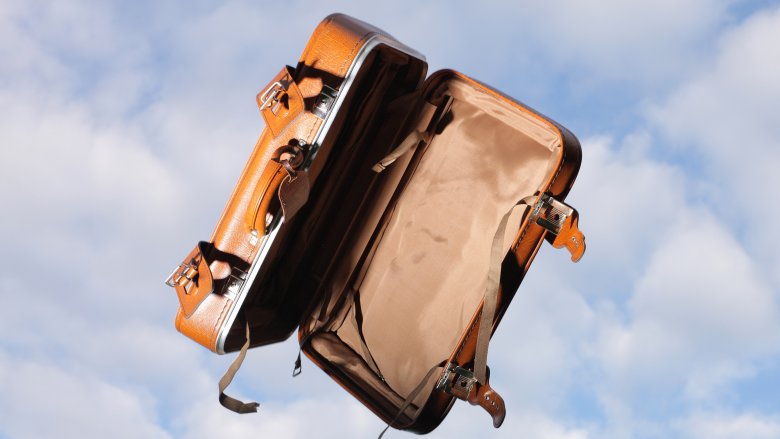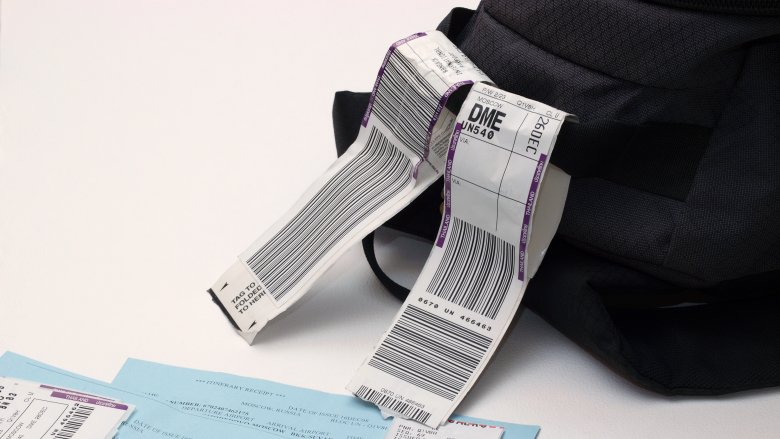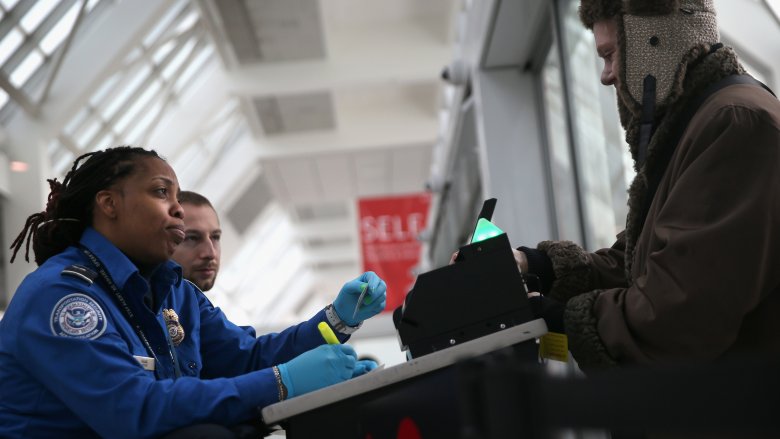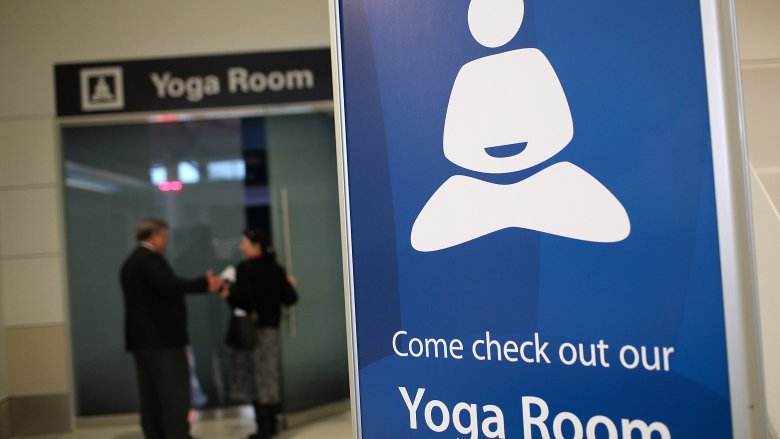Secrets Airports Don't Want You To Know
There's no two ways about it: airports are stressful. In most cases, we rush through them too quickly to take in the scenery of the shops, appreciate the nuances of the architecture, or notice all the little things. Here are a few secrets about airports that may leave your feelings on flying up in the air. Read on before you take off.
You're most likely to spend money during the 'golden hour'
No one wants to miss a flight. Sure, you're just going to sit in the terminal, but that's a stress-free hour right there. It's practically a perk. And you don't have to twiddle your thumbs: there are plenty of stores and bars to keep you occupied. Welcome to the 'golden hour.'
According to The Economist, this is when travelers' moods and wallets are most vulnerable to shops and restaurants in the concourse. But it goes beyond buying magazines and overpriced sandwiches in plastic boxes. Travel retail has expanded into luxury items and for many brands has become the "Formula I of retail," accounting for big revenues.
Retailers are milking these tawny ticks of time for all they're worth, doing everything they can to grab the attention of captive travelers and convert that attention into cash. Free glass of champagne at the high-end boutique? "Well, I'm not going to buy anything there, but it'll be fun to just look." (Good luck.) At London's Heathrow Airport, one big retailer even adjusts its offerings and sales strategies based on when certain flights land and take off. Other airports have rewards programs for frequent fliers to grant them perks for spending more money throughout the concourse. So even if you shaved $50 off your ticket by adding that layover in Kansas City, you might not save money in the long run.
The employees might steal from you
Air travel is an exercise in optimism. You have to believe that your pilot won't binge on bourbon, your seatmate won't spread the plague, and the beast on your plane's wing isn't wicked. Even before you leave the ground, you have to trust that the people who handle your bags and jiggle your junk won't pilfer your stuff. Unfortunately, sometimes those individuals treat your luggage like an all-you-can-leech buffet.
Reports of employee theft have cropped up at various airports, and none of the cases seem anomalous. According to ABC, between 2003 and 2012 at least 381 TSA officers were sacked for stealing from travelers. Among them was Pythias Brown, who snagged over $800,000 worth of electronics and other high-priced items during his four years at Newark Liberty International Airport. Brown claimed "a culture of indifference" had fostered a filching free-for-all. He also explained that luggage X-rays helped offending officers determine who to rob and what to take.
Knowing how airport thieves operate hasn't necessarily discouraged them. In 2015, video footage obtained by CNN showed baggage handlers at Miami International Airport snatching up passengers' belongings. And in 2017, the New York Daily News described how a TSA agent in Orlando used a security pat-down to steal money. In fact, of the 30,621 passenger items reported missing between 2010 and 2014, most disappeared from checked baggage while the rest apparently vanished at TSA checkpoints. So if you like to fly, pack like a poor guy.
TSA agents have routinely failed security tests
By now, you probably know the drill going through airport security in the U.S.: kick your shoes off, remove watches and jewelry, put laptops in separate bins, flash your whole body at someone in a dark room, etc. All these measures are supposedly designed to help TSA agents keep weapons and illegal substances off airplanes. But it doesn't always work. TSA agents failed 95 percent of security tests run by undercover Homeland Security agents in 2015. In 67 out of the 70 tests run, TSA agents failed to find weapons, including a fake explosive device strapped to one undercover agent's back.
Heads rolled immediately, but it doesn't sound like things have improved much. In February 2017, 11 passengers waltzed through JFK's terminal to their gates without being screened. No TSA agents were at the checkpoint to operate scanners or do secondary pat-downs. The passengers were all able to board their flights before anyone caught up to them, but don't worry — TSA said it would screen them when they landed. This incident came on the heels of the arrests of a dozen TSA agents who were allegedly helping smuggle cocaine between Puerto Rico and the U.S. Just something to think about the next time your toothpaste gets confiscated.
The TSA is understaffed at many airports
Perhaps the only line longer than the checkout line at any Trader Joe's in the world is the one to get through security at the airport. While long lines are often made worse by infrequent travelers who fail to read instructional signs placed throughout the queue, many TSA security checkpoints are simply understaffed. This causes delays in screenings and missed flights. In May 2016 alone, over 1,000 American Airlines passengers missed their flights at Chicago O'Hare due to excessive TSA lines, according to the Chicago Tribune. The TSA noted the number of screeners at airports throughout the U.S. dropped 15 percent between 2011 and 2016, mostly due to budget caps and shake-ups within the agency.
But it also cut staff when it introduced the PreCheck program, thinking it would help expedite the security screening process and that fewer screeners would be needed. The TSA PreCheck program is meant to help frequent fliers breeze through security: just pay $85, fill out an application, and pass a background check. As of April 2016, only 6.5 million travelers had signed up for the program, far fewer than TSA had hoped. And with more people flying than ever, lines could keep getting longer and longer. Get there early and hit up the yoga studio.
Facial recognition scanners could be tracking you
If you thought getting an unwanted pat-down by a sweaty TSA agent was invasive, get ready for some high-tech privacy invasion that you don't even have to feel. According to Mashable, if the Department of Homeland Security has its way, every airport in the country could have facial recognition scanners track you throughout the terminal. The software would check passengers' faces against IDs to confirm their identities. It's an honorable goal! It's also a slippery slope, and it's already installed at Hartsfield-Jackson International Airport in Atlanta, with plans to add seven more airports in summer 2017.
Want more? A company called Genia Photonics has developed a ridiculously sensitive laser molecular scanner that could be integrated into security checkpoints. Though the program seems to have been put on hold, these scanners would be able to pick up even the slightest changes in molecular composition, including drug residues and maybe what you had for breakfast. Leggo my Eggo, DHS.
American airports have a history of sketchy hires
In era of grope-alicious security screenings, you'd hope that airport workers undergo rigorous vetting. So it'll probably irk you that the TSA has a documented history of hiring potentially dangerous people. As per CNN, the problem dates back to the early 2000s. The TSA needed to fill 55,600 screener positions and in a shortsighted haste, the organization allowed 28,000 people to work without completing background checks. Of those individuals, 1,208 later got canned over basic ineligibility. This included 503 applicants with prior arrests or convictions and 85 felons.
Well over a decade after its inception, TSA still had serious kinks to work out. In 2015, the agency drew blistering criticism for hiring 73 suspected terrorists. According to the LA Times, the agency cleared these individuals to enter secured portions of the airport despite posing a possible threat to national security. Let that sink in. A government entity created in response to a plane-based terror attack recruited possible terrorists for security positions at airports. Sweet absurdity, that's like asking a lion to babysit gazelles.
Worse yet, airports in general have shown unsettling laxness in their hiring decisions. In 2015, a counterterrorism expert for the FBI confirmed that once applicants passed preliminary background checks, no one checked their criminal histories. Moreover, they got to skip security screenings at airports, CNN elaborated. Since then, the TSA has mandated biennial background checks for aviation workers and made other improvements. Better ridiculously late than never.
'Duty-free' doesn't always mean cheaper
Everyone knows that airport shopping means sky-high prices unless you go for duty-free goods, which go largely untaxed. At least then, rather than spending an arm and a leg on stale licorice, you'd only have to fork over a few fingers. Of course, that assumes airport vendors won't jack up the fees anyway. And you know what happens when you assume; you make an asinine spending decision.
CBS put it best: "Just because a duty-free shop can offer lower prices does not mean that they always do." Travelers in the U.K. discovered this duplicity in 2015 when The Independent reported that various "duty-free" stores were charging doody fees. As it turned out, retailers had advertised products as untaxed without adjusting prices accordingly. Instead they just pocketed the difference.
Even when vendors aren't hosing you like an overzealous fireman, duty-free shopping comes with shortcomings. CBS explained that only certain goods make for good deals. Untaxed tobacco and booze, for instance, sell for way cheaper than they otherwise would. You won't get as steep a discount when buying electronics, non-specialty foods, or certain cosmetics. In some cases, you'd save more money swinging by shopping elsewhere. So unless you plan to singe your lungs or liquor up your liver on the cheap, don't count on copious savings if you decide to go the duty-free route.
A dentist could double as an INS agent
Here are two weird things. First, there is such a thing as an airport dentist. According to the Wall Street Journal, one dentist has been seeing patients for over 30 years at JFK and LaGuardia airports in New York. Dr. Robert Trager took over the small dental office at JFK International Airport in the 1980s before expanding his practice to Terminal B at LaGuardia Airport in 1991. He sees a regular slate of patients like airline and airport employees, frequent fliers, and emergency walk-ins.
Second, this airport dentist also plays an important role in security. The New York Times reports that because dental bones are a pretty reliable way to determine a person's age, Trager is often asked to examine asylum seekers or immigrants trying to enter the U.S. Minors aren't subject to immediate deportation, so Trager can check the progress of their wisdom teeth and wrist bones to try to verify they're minors. He's been doing double duty as an INS agent since 1997, working six days a week out of his two airport locations and a third location in Queens. His JFK office is outside the main airport building, so his wife (whom he met on the job) drives patients from the main terminal to his office. Getting chauffeured back and forth is just one more reason to join Dr. Trager's infamous Smile High Club.
Federal agents might seize your cash
The law works in mysterious ways. Turning a TSA pat-down into a shakedown is indisputably illegal. But if you walk into an airport with boatloads of cash, the DEA can totally take it whether you've committed a crime or not. Fortunately, this doesn't occur at random; agents target those deemed suspicious. Unfortunately, the standard for "suspicious" seems pretty broad.
Obviously, if you have a suitcase full of heroin and hundred-dollar bills, you should expect trouble. But as per USA Today, law enforcement can flag you simply for using a certain airport and buying your ticket with cash. Even buying a one-way ticket to the wrong city can trigger a cash seizure. And thanks to travel industry informants, the DEA can easily track this information without a warrant or an active investigation. If agents decide you're up to no good, asset forfeiture laws permit them to commandeer your cash without charging you for a crime.
Christelle Tillerson learned this firsthand in 2014 when the DEA stopped her at a Detroit airport and took $25,000 in cash. She had legally obtained the money from her beau to buy a truck. Even so, a past drug conviction and a one-way ticket to Los Angeles prompted agents to track her down, snatch her cash, and charge her with absolutely nothing. The DEA returned Tillerson's cash (a year later) once she proved where she got it, but even then they kept $4,000 with no real explanation. Somehow, that's legal.
Baggage handlers get really rough with your stuff
Every trip to baggage claim feels like a post-fight interview. Your bag looks like it lost a boxing match with a bulldozer, though it probably just got jostled around in the plane's luggage department. Then again, maybe a baggage handler kicked it halfway to oblivion.
In 2017, The Independent offered an inside look at the world of baggage handling. Their interview subject, a former employee who went by the pseudonym Aaron, painted an unsavory portrait of luggage-lugging. It wasn't torturously uneventful like you might imagine. Rather, it seemed more like an airport fight club made up of passenger bags and the people who punch them. Aaron witnessed workers intentionally throw, kick, and even lick bags during his summer-long stint. To the employees' credit, the licking only occurred when someone's luggage leaked alcohol. Much to their discredit, they also rooted through people's undergarments for (nonviolent) kicks.
Crucially, workers didn't just batter baggage for fun. Some of their roughness stemmed from time constraints. In order to save time and money, they needed to haul bags in a hurry, resulting in plenty of hurling. To avoid seeing your suitcase pummeled to a pulp, Aaron recommended buying moderately expensive bags. Overly cheap ones might burst like bubbles while extremely expensive ones might draw the attention of bored employees and potential thieves. It also helps to lock your luggage shut, lest handlers get their hands on your panties.
Airports sometimes sell your missing baggage
Virginity and body fat aside, people hate losing things. It can suck the joy out of any moment, especially when travel's involved. Paris's pee-stained streets really lose their appeal once your undies go missing. Luckily, when an airline loses your luggage or it just gets left behind, there's a great chance you'll get it back. But if you don't, an airport will probably sell it.
Surprisingly, your misplaced baggage doesn't end up in the land of missing dryer socks. Instead, as ABC described, your erstwhile belongings might become auction fodder. Miami International Airport, for instance, holds a twice-yearly luggage sale where people pay an entry fee to bid on bags, electronics, and other goodies. These events occur across the U.S. and overseas. U.K. airports, for instance, have blind luggage auctions in which people buy orphaned bags without knowing what's inside, according to Vice. Naturally, anything overly expensive or unsuitably intimate (like your missing diamond-encrusted undies) gets removed first.
Not every misplaced possession makes its way to an airport eBay. American airports often sell lost valuables to the Unclaimed Baggage Center, which is essentially the retail equivalent of a scavenger. Located in Scottsboro, Alabama, the store is the only one of its kind in the U.S. and offers between 5,000 and 7,000 "new" items daily. So if you really miss your missing stuff and don't mind searching forever, it wouldn't hurt to add Scottsboro, Alabama, to your travel plans.
Beware the barcodes on your luggage and passports
Nobody wants to get to their destination only to discover their luggage has been lost or didn't make it on the same flight. To combat this, airlines have made improvements to the barcoded tags attached to checked bags in order to better track the location of your precious cargo. According to the New York Times, Delta has even started using tags that have embedded RFID chips to make it even easier for scanners to read and locate luggage. However, PC Magazine reports these barcodes contain sensitive personal information such as your address, frequent flyer number, and travel destination, which thieves can easily access. Don't keep your airline tags as badges of honor; rip them off once you reach your final destination. However, a motivated thief can easily take a picture of it in the airport, like if you get distracted by a free glass of champagne or something.
Barcodes are used for security reasons, too. At Israel's Ben Gurion International Airport, security is notoriously tight. Agents attach stickers with barcodes and a 10-digit number on the back of each passenger's passport. Though it hasn't been officially confirmed, the first digit in the number is thought to indicate the threat level that person poses on a six-point scale. A 1 is rumored to be "friendly" or low-threat while a "hostile" 6 is supposedly guarantees you some extra face time with a security guard.
Chatty security guards are probably testing you
Next time you find yourself having a friendly chat with a TSA agent about your awesome vacation plans, you may just be going through another screening test. A 2014 study done primarily at European airports like London Heathrow and Charles De Gaulle in Paris found that controlled cognitive engagement (CCE) was 20 times more successful than just looking for suspicious behavior. Agents ask open-ended questions about your destination, itinerary, and what you'll do at your destination. It should feel like a normal conversation, but liars are likely to feel trapped. Suspicious individuals "tend to have a script they have developed and will try to second-guess the questions they're going to be asked. The secret to our technique is that it's never the same," researcher Coral Dando told The Guardian.
Most airports already use SPOT (Screening of Passengers by Observation Techniques), to analyze nonverbal cues like fidgeting or lack of eye contact thought to be "tells" of suspicious behavior patterns. A 2013 internal government study found the SPOT method wasn't very effective by itself, and that was before CCE had been assessed. CCE has yet to be adopted widely by airports outside of Europe, but it seems likely, given its proven effectiveness, that it will become a regular part of the screening process before long. Hope you're feeling chatty next time you're standing at a security checkpoint.
Get some sleep or zen in the middle of your travel day
Avoiding the shops but have a long layover? While most U.S. airports have some kind of chapel where travelers can pray or meditate away from the rush, there are other options but they have to stay obscure so they don't get overcrowded. Some airports have yoga studios, usually tucked away from busier terminals and with limited hours and space, meaning most average travelers don't even know they exist. But frequent fliers are taking advantage of these zen spots in greater numbers. San Francisco's airport added an additional yoga studio recently to accommodate more travelers who want to practice their sun salutations. Both of Chicago's airports as well as Burlington International Airport have spaces for yoga; Dallas/Fort Worth International Airport even has instructional videos in its two studios.
Gyms are also popping up. Baltimore Washington International Airport has a gym for travelers needing a workout before or after long flights. McCarran Airport in Las Vegas also offers a gym with showers if you want to work off all the casino drinks and buffets. But it also has a few private bedrooms available for as little as $5 an hour where you can get some rest. And since whatever happens in those bedrooms is still happening in Vegas, it'll stay there.
